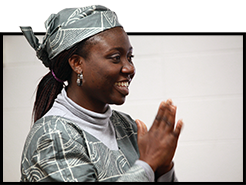Lesson 5: Special Guest ~ African Storyteller on Wheels

Retrieved from African Storyteller on Wheels website
Grade: 3rd
Time needed: 10 minutes + length of presentation (~60 minutes)
Essential question of the unit being addressed in this lesson
How accurate are the stereotypes about Africa?
How do these stereotypes affect our understanding of people, cultures, practices, countries, history, and politics in Africa?
How can we debunk stereotypes about Africa?
Lesson Objectives
Students will be able to…
- Develop critical questions that relate to stereotyping and African culture for a culturally
specific audience, an individual from Africa
- experience an authentic portrayal of African storytelling through a special guest
- compare their experience with authentic African culture to their prior experiences
learning about Africa in the classroom
- show respect for others, particularly guests in the classroom, by being attentive
listeners
MMSD standards
Behavioral Science
3. Demonstrate respect and responsibility for self, others and property
NCSS standards
I. Culture and Cultural Diversity
- to understand and apply the concept of culture as an integrated whole that governs the
functions and interactions of language, literature, arts, traditions, beliefs, values, and
behavior patterns
Materials needed
- Dry erase board or chalk board
- Any materials specified by special guest
- Contact information for African Storytellers on Wheels
205 Ingraham Hall
1155 Observatory Drive
Madison, WI 53706
Tel: (608) 265-7955 Fax: (608) 265-5851
Email: [email protected]
Website: www.africa.wisc.edu/asw/
Instruction/Activities
Got Questions?
Explain to the students to the students the special guest that they will be having:
We will be having a special guest from UW-Madison come to our classroom to teach us about African culture and traditions through storytelling. Our guest is from Africa, but now lives here in Madison. He/she can teach us a lot about ___(insert their native country) because they lived there. He/she offered to answer our questions about Africa, their experiences with stereotypes, or anything else you would like to know about their country’s culture. Let’s brainstorm a list of your questions so we can be prepare to ask them when they visit our classroom
Brainstorm a classroom list of the questions they might have for the special guest. During the Q&A time, these questions should still verbally come from the students, but the list serves a way for students to begin thinking about their questions before they have time pressure to do so.
Welcome to our class!
Schedule and invite a representative from the African Storytelling on Wheels program to come to the classroom. This is an authentic way for students to learn about African culture, both generally and specifically, since the representatives are of African origin.
On the program’s website, it is clearly stated that one of their main objectives is:
To give Wisconsin elementary students cultural knowledge of Africa from an African perspective. To accomplish this objective, UW-Madison faculty and staff members, organized by the project leader and co-leader under the aegis of the African Studies Program, train UW students of African origin in the art of storytelling. Once trained, these UW students make presentations built around African stories in elementary schools.
The storyteller teaches the students about thepolitical and ecological geography of Africa, oral traditions, clothing, music, dance, instruments, African philosophy and ethics and language. Throughout the storytelling, students actively participate by anticipating the ending and answering questions about the story. They also will have an opportunity to play musical instruments with some assistance.
Debriefing
Students will ask the special guest their initial questions they brainstormed before the presentation. This will be an opportunity for the students to get their questions answered as well as make connections with what they have been learning about Africa in previous lessons.
Assessment
Informal
Observation-based assessment. Since the teacher has very little involvement in the lesson, there will be opportunity to observe the students participation level, ability to be attentive and show respect to classroom guest, and their willingness to pose questions about their what they are still wondering.
